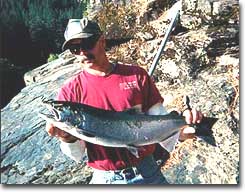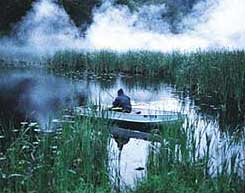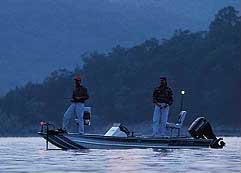Winter Depressions Lead to Big Fish
Winter Depressions Lead to Big Fish
By David Heinke  The first time I heard the words, "holding water" I was about twelve years old. Of course along with the words holding water I was also told, "you're standing where you should be fishing!" Thus began the phase of my fishing career where instead of being coddled and encouraged, the reprimands along with lessons started. It was also at that time the foundation was laid for my so-called sixth sense for finding fish. The first time I heard the words, "holding water" I was about twelve years old. Of course along with the words holding water I was also told, "you're standing where you should be fishing!" Thus began the phase of my fishing career where instead of being coddled and encouraged, the reprimands along with lessons started. It was also at that time the foundation was laid for my so-called sixth sense for finding fish. This article is meant to help find fish in the winter in just about all types of water. You will also be able to use some of the tactics here to find fish throughout the year, but if you want to catch fish in the colder months the following information is vital. If you want to return to the dock with fish or at least the memories of battles won or lost, you must find holding water. If not to at least catch fish, but because its winter, its cold and the only thing worse about getting skunked is getting skunked when the weather is nasty. You could have been at home all day in front of the fireplace, but nooooo you had to go fishing.  Holding water in its simplest terms can be applied to almost all fish and is basically a type of structure where fish live. The holding water I was standing in as a teen was on trout stream and the components that make good holding water are the same from a babbling brook to open ocean. Think about what makes your home cozy. A home offers protection from the heat and cold provides sanctuary from enemies and hopefully also provides easy access to the supermarket. A fish looks for the same things and when you can find a piece of water that can accommodate these items, then you can bet there is going to be at least one fish that calls that water home. Holding water in its simplest terms can be applied to almost all fish and is basically a type of structure where fish live. The holding water I was standing in as a teen was on trout stream and the components that make good holding water are the same from a babbling brook to open ocean. Think about what makes your home cozy. A home offers protection from the heat and cold provides sanctuary from enemies and hopefully also provides easy access to the supermarket. A fish looks for the same things and when you can find a piece of water that can accommodate these items, then you can bet there is going to be at least one fish that calls that water home. Not many fish are at the top of the food chain and as a result, fish are wary by nature and will try to take every advantage they can to stay alive. Predators lurk everywhere, but especially from above in the form of birds, otters, and humans to name a few. Whenever a fish can find a location that makes it difficult for a predator to approach, a fish will hold in that location before moving on. If that location also offers deep enough water to withstand drought, low tides, and severe temperature changes, then the fish, and you my friend, have found prime holding water. Water stratifies and at various depths you will find different temperatures and currents. Do you remember testing the water at the lake with your toes and found it to be pleasant, but after diving in and reaching a depth where the thermocline met the warmer surface water you realized your mistake and reach the surface exclaiming, "Wow that's cold!" All fish have what is called a comfort range for water temperature. Below or above that range their life becomes difficult or not possible. As a result, fish will seek out water that is conducive to their comfort zone. Fishing in the winter provides many additional challenges, but if done properly, can be as rewarding if not more than fishing during the temperate months. The crowds will always be less, especially on Super Bowl Sunday, and you can be sure you won't be waiting in line to launch your boat at the ramp. Of course in the northern states you don't even have to worry about your boat, just cutting a hole through many inches of ice. To begin a day of winter fishing it is absolutely vital that you prepare for weather. If it's seventy degrees and sunny, then celebrate and wear that T-shirt, but also have plenty of warmer clothes to don in case the weather changes…which happens often in the winter. However, accept the fact that fishing in the winter is going to be an activity pursued in colder weather. Warm socks, gloves, hat and a good foul weather outfit are essential to staying comfortable and enjoying your fishing. Finding the fish is other part of the equation. When the water temperatures start to drop, the fish are going to move to water temperatures they can tolerate. Many times this will be a depression or hole several feet deeper than the surrounding area. In lakes or bays, you will need a chart and a fish finder to locate these areas. Many times holes will develop around bridge pilings if there is any current involved. In riparian environments, the deepest water can always be found on the outside bend of a stream and of course at the base of falls or anywhere the hydrology can dig away at the earth to produce deeper pools.  In colder water, the metabolism of the fish will tend to slow down. As a result, the fish will tend to eat less often and will not expend a lot of energy chasing the food. The size of food tends to correlate with its ability to escape. If a fish only has to move an inch or two to eat many small items it will do this as opposed to chasing a larger food source burning more calories than it might take in. However, the opposite is true as well, if the fish can eat one bigger meal easily, it might pass up smaller more agile treats. Try to find what the fish might be eating-ask around-and start with those baits. In colder water, the metabolism of the fish will tend to slow down. As a result, the fish will tend to eat less often and will not expend a lot of energy chasing the food. The size of food tends to correlate with its ability to escape. If a fish only has to move an inch or two to eat many small items it will do this as opposed to chasing a larger food source burning more calories than it might take in. However, the opposite is true as well, if the fish can eat one bigger meal easily, it might pass up smaller more agile treats. Try to find what the fish might be eating-ask around-and start with those baits. Remember fish will usually be more sluggish in the winter, so if you are using lures, slow down your presentation and retrieve. You will not get the savage strikes you would expect in warmer weather and many time you don't even feel the take until your rod starts to bend over. One of the greatest frustrations in steelhead fishing, is that you are out in frigid weather, you can't feel a thing and the fish will take your offering so lightly, you swear you just bumped the bottom. I've missed WAY more steelhead than I care to admit, because I didn't even know were admiring my fly or bait. Where I live now in north Florida, winter can provide excellent fishing for those who brave the weather, shun the football games and know where to fish. Redfish and trout move into the rivers and creeks and will find the deepest holes to hunker down. By exploring the bends of the creeks with a slow presentation, you can have a lucrative day fishing. Another advantage is that these creeks are many times protected from the wind and conditions are almost pleasant. Except for real toothy fish, I usually don't use a landing net, but that is because I have learned over the years how to handle and release without harming them. However, when the weather turns cold in the winter and the water goes below 60 degrees, I am the first person to grab a landing net. Fish tend to revive more quickly in cold water and if you intend to release your catch, please use a landing net and try to keep the fish in the water while removing the hook. Take a picture for your memories and then quickly release the fish to fight again another day. To wrap up, the key to finding fish in the winter months is to find a place that a fish might want to call home. Deeper water, adequate food supplies and structure of cover from predators. Avoid the winter blues by looking for depressions in the bottom or fish the areas where you know that erosion from moving water will help dig out depressions. The moving water also adds the source for food and two pieces of the puzzle will result in a few fish. Add cover from predators and you'll find a winter fish factory! Watch the weather channel and if a weekend pops up with tolerable temperatures and light winds, head on out to the water and try a little depression fishing. Of course if you don't find any fish, then they must be back at your place enjoying the fireplace and football games! Until next time,
Stay warm! This article is printed with permission from West Marine. Visit their website, http://www.westmarine.com for more boating supplies and information.
|
